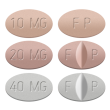
Celexa
Celexa (citalopram HBr) is indicated for the treatment of depression.
| Package | Per pill | Savings | Price | Order |
|---|---|---|---|---|
| 10 pills | $ 1.10 | $ 10.99 | ||
| 20 pills | $ 0.78 | $ 6.33 savings | $ 15.65 | |
| 30 pills | $ 0.68 | $ 12.61 savings | $ 20.36 | |
| 60 pills | $ 0.53 | $ 34.01 savings | $ 31.93 | |
| 90 pills | $ 0.44 | $ 59.66 savings | $ 39.25 | |
| 120 pills | $ 0.44 | $ 79.67 savings | $ 52.21 | |
| 180 pills | $ 0.35 | $ 135.53 savings | $ 62.29 | |
| 270 pills | $ 0.34 | $ 205.31 savings | $ 91.42 | |
| 360 pills | $ 0.30 | $ 286.81 savings | $ 108.83 |
| Package | Per pill | Savings | Price | Order |
|---|---|---|---|---|
| 10 pills | $ 1.81 | $ 18.05 | ||
| 20 pills | $ 1.12 | $ 13.69 savings | $ 22.41 | |
| 30 pills | $ 0.95 | $ 25.52 savings | $ 28.63 | |
| 60 pills | $ 0.79 | $ 61.00 savings | $ 47.30 | |
| 90 pills | $ 0.71 | $ 98.85 savings | $ 63.60 | |
| 120 pills | $ 0.66 | $ 137.10 savings | $ 79.50 | |
| 180 pills | $ 0.61 | $ 214.35 savings | $ 110.55 | |
| 270 pills | $ 0.58 | $ 329.66 savings | $ 157.69 | |
| 360 pills | $ 0.57 | $ 445.70 savings | $ 204.10 |
Description
The efficacy of Celexa in the treatment of depression was established in 4-6 week, controlled trials of outpatients whose diagnosis corresponded most closely to the DSM-III and DSM-III-R category of major depressive disorder. A major depressive episode (DSM-IV) implies a prominent and relatively persistent (nearly every day for at least 2 weeks) depressed or dysphoric mood that usually interferes with daily functioning, and includes at least five of the following nine symptoms: depressed mood, loss of interest in usual activities, significant change in weight and/or appetite, insomnia or hypersomnia, psychomotor agitation or retardation, increased fatigue, feelings of guilt or worthlessness, slowed thinking or impaired concentration, a suicide attempt or suicidal ideation.
How To Take
Celexa should be administered once daily, in the morning or evening, with or without food. Celexa (citalopram HBr) should be administered at an initial dose of 20 mg once daily, with an increase to a maximum dose of 40 mg/day at an interval of no less than one week. Doses above 40 mg/day are not recommended due to the risk of QT prolongation. Additionally, the only study pertinent to dose response for effectiveness did not demonstrate an advantage for the 60 mg/day dose over the 40 mg/day dose.
Precaution
Patients should be monitored for these symptoms when discontinuing treatment with Celexa. A gradual reduction in the dose rather than abrupt cessation is recommended whenever possible. If intolerable symptoms occur following a decrease in the dose or upon discontinuation of treatment, then resuming the previously prescribed dose may be considered. Subsequently, the physician may continue decreasing the dose but at a more gradual rate. Patients should be cautioned about the risk of serotonin syndrome with the concomitant use of Celexa and triptans, tramadol or other serotonergic agents. Patients should be advised that taking Celexa can cause mild pupillary dilation, which in susceptible individuals, can lead to an episode of angle closure glaucoma. Pre-existing glaucoma is almost always open-angle glaucoma because angle closure glaucoma, when diagnosed, can be treated definitively with iridectomy. Open-angle glaucoma is not a risk factor for angle closure glaucoma. Patients may wish to be examined to determine whether they are susceptible to angle closure, and have a prophylactic procedure (e.g., iridectomy), if they are susceptible.




















